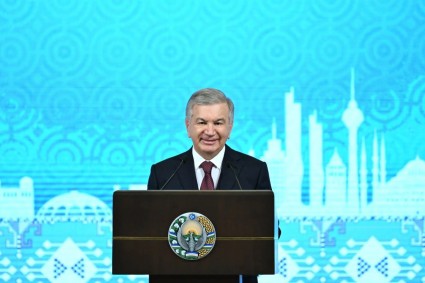This year Kazakhstan is planning to commence the construction of the third line for Bukhara-Ural gas pipeline, which runs from Uzbekistan through Kazakhstan to Russia, announced the governor of Kazakhstan’s Aktobe region Yeraly Tugzhanov.
“For our region, the problem of gas supply is currently topical. There is enough raw material, but the existing networks cannot provide the transportation of the volume that the region needs. Now they are overloaded. There is only one solution - the construction of the third line of the Bukhara-Ural gas pipeline," he said.
According to him, this is a “huge project”, expanding to 162 km at the total cost of about 43 billion tenge (about $95.6 million). “This year we will commence the construction. Without this, we will not be able to address the gasification problem of the villages,” he added.
Construction work is scheduled to start in March.
The total length of the gas pipeline, which connects Uzbekistan, Kazakhstan and Russia, is over 4,500 km. The first of the two lines of the Gazli - Chelyabinsk gas pipeline was launched in 1963, the second Gazli - Chelyabinsk - Sverdlovsk - in 1966. The pipeline is controlled and maintained by Gazprom.
In the autumn of 2014, the gas pipeline was launched in reverse mode, that is, gas began to be supplied in the opposite direction, Gazprom thus supplies the southern regions of Kazakhstan.
Tripartite Gas Alliance
On November 28, 2022, Russian President Vladimir Putin discussed the creation of a Tripartite Gas Alliance
between Russia, Kazakhstan and Uzbekistan with Kazakh President Kassym-Jomart Tokayev. The spokesman of the Russian president, Dmitry Peskov, specified that the routes for energy supplies in this region are "extremely relevant" and such an alliance "would be in the interests of all three countries."
On December 8, Uzbek Energy Minister Zhurabek Mirzamakhmudov said that the country is negotiating with other countries to import gas and electricity through a commercial sale contract based on national interests, not through some sort of alliance or union.
Initially the Russian side proposed to supply natural gas of Russian origin in a reverse order, through Kazakhstan via the Central Asia-Center (CAC) pipeline.
The main condition of the Russian side was the transfer of Uzbekistan’s gas transmission grid to the ownership of Gazprom at market value. The second condition is the assignment of the right to export gas to China, that is, Gazprom offered to become a party to the agreement instead of the Uzbek company UzGazTrade. As a result of bilateral negotiations in December, it was possible to remove the conditions set by Russia.
In January, Gazprom signed roadmaps with Uzbekistan and Kazakhstan. The Russian Kommersant newspaper in the same month collected expert comments on this matter.
According to Maria Belova of Vygon Consulting, the ultimate goal of reversing the Central Asia-Center pipeline is not to supply the markets of Uzbekistan and Kazakhstan, but to increase Russian gas exports to China, either directly or through a swap.
Independent expert Alexander Sobko suggests that if Gazprom starts supplying more gas to Uzbekistan, then Uzbekistan itself would be able to export more gas to China. “The price and profitability of such supplies will, of course, become a key one,” he added.
Sergei Kondratiev from the Institute of Energy and Finance believes that the allocation of one of the threads of the "Central Asia-Center" system for reverse supplies from Russia to Kazakhstan and Uzbekistan would allow the full loading of the line, which is currently used only by 30%, and increase supplies in the direction of southern Kazakhstan and Ferghana Valley - major centers of gas consumption in Central Asia. According to him, at the initial stage, we can talk about deliveries of up to 6-7 billion cubic meters annually.















